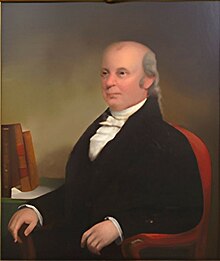Levi Lincoln | |
|---|---|
 | |
| Acting Governor of Massachusetts | |
| In office December 10, 1808 – May 1, 1809 | |
| Preceded by | James Sullivan |
| Succeeded by | Christopher Gore |
| 4th United States Attorney General | |
| In office March 5, 1801 – March 3, 1805 | |
| President | Thomas Jefferson |
| Preceded by | Charles Lee |
| Succeeded by | John Breckinridge |
| United States Secretary of State Acting | |
| In office March 5, 1801 – May 1, 1801 | |
| President | Thomas Jefferson |
| Preceded by | John Marshall |
| Succeeded by | James Madison |
| 7th Lieutenant Governor of Massachusetts | |
| In office May 29, 1807 – May 1, 1809 | |
| Governor | James Sullivan |
| Preceded by | Edward Robbins |
| Succeeded by | David Cobb |
| Member of the U.S. House of Representatives from Massachusetts's 4th district | |
| In office December 15, 1800 – March 5, 1801 | |
| Preceded by | Dwight Foster |
| Succeeded by | Seth Hastings |
| Personal details | |
| Born | Levi Lincoln May 15, 1749 Hingham, Massachusetts Bay, British America |
| Died | April 14, 1820 (aged 70) Worcester, Massachusetts, U.S. |
| Political party | Democratic-Republican |
| Spouse | Martha Waldo |
| Children | 10, including Levi and Enoch |
| Education | Harvard University (BA) |
| Signature | |
| Military service | |
| Allegiance | |
| Branch/service | Massachusetts militia |
| Battles/wars | Siege of Boston |
Levi Lincoln Sr. (May 15, 1749 – April 14, 1820) was an American revolutionary, lawyer, and statesman from Massachusetts. A Democratic-Republican, he most notably served as Thomas Jefferson's first attorney general, and played a significant role in the events that led to the celebrated Marbury v. Madison court case. He served two terms as the lieutenant governor of Massachusetts, acting as governor for the remainder of Governor James Sullivan's term after his death in December 1808. Lincoln was unsuccessful in his bid to be elected governor in his own right in 1809.
Born in Hingham, Massachusetts, Lincoln was educated at Harvard, and studied law with Joseph Hawley before establishing a law practice in Worcester, Massachusetts. He was active in local politics, and participated in the convention that drafted the Massachusetts Constitution in 1779. He supported Quock Walker, a former slave seeking confirmation of his freedom under that constitution in 1783. He entered national politics with his election to the United States House of Representatives in 1800, but was immediately tapped by Jefferson to become Attorney General. Lincoln served Jefferson as a consultant on the politics of New England, and was influential in the distribution of patronage in the region. He served on a commission that resolved claims emanating from the Yazoo land scandal in Georgia, and advised Jefferson on matters related to the Louisiana Purchase.
He returned to Massachusetts, where he remained politically active in the state. He established Republican dominance in Worcester, even though the state was dominated by Federalists. He was elected lieutenant governor under James Sullivan in 1807, but failed to win election in his own right in 1809 in a highly partisan election. He retired from politics in 1811, declining nomination to the Supreme Court because of his health.